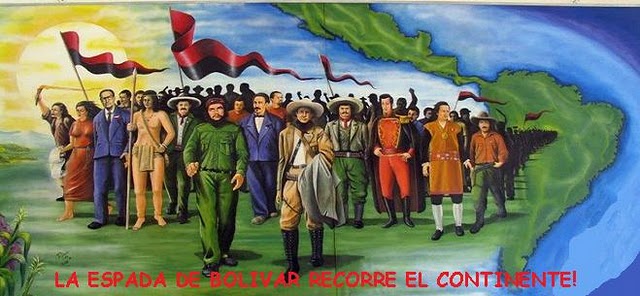These days, he's only a problem for us
 How times change. As the diplomat Chávez once championed to lead the OAS openly calls for a formal debate on his increasing authoritarianism and says the Enabling Law violates the Democratic Charter, the time has come to reflect on just how far Chávez’s hemispheric prestige has fallen from not so long ago, when Bolívar’s sword really did seem to be on the march through America Latina.
How times change. As the diplomat Chávez once championed to lead the OAS openly calls for a formal debate on his increasing authoritarianism and says the Enabling Law violates the Democratic Charter, the time has come to reflect on just how far Chávez’s hemispheric prestige has fallen from not so long ago, when Bolívar’s sword really did seem to be on the march through America Latina.
It’s easy to forget now, but in the middle of the last decade, Chávez loomed as a real threat to Pluralist Constitutional Democracy throughout the hemisphere. With ALBA in the ascendant alongside the price of oil, Chávez was busy securing power for allies in countries big and small. Under Evo, Bolivia was well on its way to becoming a Venezuelan satellite, and Rafael Correa had jumped on the ALBAndwagon, too. Argentina, Paraguay, Uruguay were turning sharply to the left, while Chile and Brazil had governments forced to at least feign ideological sympathy with the Caracas-Havana axis.
Perhaps most alarmingly, charismatic far-left leaders were in the ascendent in both Mexico and Peru, with just two governments in the whole region playing defense: the most unpopular US government in decades, and the most extreme, paramilitary-tinged Colombian government in recent memory.
For a moment there, it was just about possible to imagine the wave turning into a tsunami. As well it might have. The old East-West cold war could have been replaced by a new North-South one. It was, looking back, kind of a close call.
Four years on, it’s hard to pinpoint where exactly the wheels came off of the hemispheric project. I think the summer of 2006 is the key moment: if just a few tens of thousands of votes had gone the other way in Peru in June and a couple hundred thousand had voted differently in Mexico in July, Chavez really might have found himself heading a credible, hemisphere-wide assault on constitutional liberalism.
It’s not too fanciful to imagine that could have knocked the whole region into a different historical trajectory. It bears remembering that Humala and AMLO really were radical leaders, far to the left of a Bachelet or a Rousseff, and they stood to take over two strategically crucial countries. It’s little wonder Chávez went far out of his way to support them.
Looking back from the vantage point of 2011, the hemispheric picture is irrecognizable. With oil prices having crashed back down to earth, the Venezuelan economy has shown itself a colossus with clay feet. As client states wise up and realize PDVSA can barely keep its own refineries running, let alone build the refineries Chávez promised them, the attractions of cozying up to ALBA have cooled considerably.
Then, Obama’s election took all the zing out of Chávez’s preferred bogeyman while, quietly, the unflashy macroeconomic reforms undertaken throughout the hemisphere (but not here) left much of the rest of the region far better prepared and more resillient to an external shock than Venezuela’s. And so, when the world financial crisis hit, countries like Brazil, Chile and Peru shook it off in just a couple of quarters while Venezuela plunged into a painful, two-year stagflationary ordeal.
All of which has conspired to leave the Castro-Chávez Hemispheric Project more or less dead in the water. These days, faced with the evident success of the more moderate left-wing governments in the region and the clanging, crashing, estrepitoso failure of the radical alternative, support for a Hard Left Turn in the region has died back down to its more historically usual level. As has been the case pretty much since the 1930s, you can still find a narrow sliver of hard-core leninist opinion in every country that salivates at the prospect of a truly radical government, but no more than that.
The historic turning point was within Chávez’s reach a few years back…and then slipped away. La Espada de Bolivar como que está en huelga de manos caídas…
Caracas Chronicles is 100% reader-supported.
We’ve been able to hang on for 22 years in one of the craziest media landscapes in the world. We’ve seen different media outlets in Venezuela (and abroad) closing shop, something we’re looking to avoid at all costs. Your collaboration goes a long way in helping us weather the storm.
Donate




